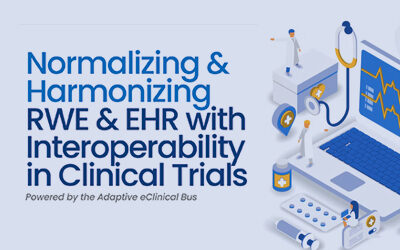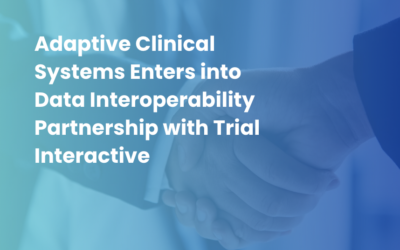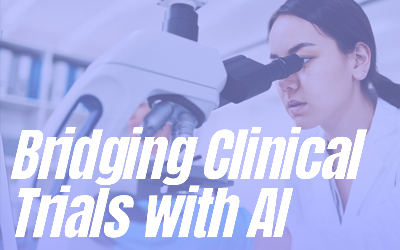Integrating AI and Human Insights: Enhancing Clinical Trials with HITL AI
By Eftim Pop-Lazarov, Chief AI Product Officer, Adaptive Clinical Systems

Introduction
Healthcare professionals, data scientists, and tech enthusiasts are all interested in how Artificial
Intelligence (AI) and Human-in-the-Loop (HITL) are reshaping clinical trials. The combination of
AI and HITL is driving big improvements in efficiency, accuracy, and patient-centric approaches.
These technologies together are crucial for the future of medical research, backed by key
studies and insights.
AI’s Diagnostic Precision
AI has reached a point where it can diagnose diseases like skin cancer with accuracy comparable to human experts. For instance, the research by Esteva et al. shows AI using Deep Convolutional Neural Networks (CNNs) achieving dermatologist-level performance. This breakthrough highlights how AI's analytical power combined with human oversight can revolutionize medical diagnostics.
Navigating AI Bias with Human Guidance
Addressing bias in AI, especially in healthcare, is complex. Holstein et al. stress the importance of human oversight in AI development to ensure ethical and inclusive systems. Their research points out the need to consider biases in various stages of the ML pipeline, such as during data annotation. My previous blog, “Conquering Bias with Precision Focus” also discusses how reframing perceived biases as specialized expertise can enrich AI’s development. This perspective underlines the potential for synergy between AI insights and human expertise, reinforcing the significance of human input in refining AI tools.
Enhancing Decision-Making in Clinical Trials with Human-AI Collaboration
In clinical trials, decisions often require complex judgments where healthcare professionals’ insights are essential. AI can support these decisions by providing data-driven insights that complement human judgment. Chen et al. explore this dynamic, showing how human intuition and AI predictions can work together to improve clinical trial methodologies. Their study highlights the need for AI systems that accommodate human intuition and support critical understanding.
Streamlining Data Management
AI and HITL are transforming data management in clinical trials, making the data exchange processes and the general interoperability between systems more efficient and precise. AI can automate tasks like data cleaning and intelligent mapping, freeing up human resources for complex analysis. However, human oversight remains crucial to ensure accuracy and compliance with regulations, as discussed by Thukral & Bhardwaj.
Conclusion
Blending AI with human expertise is set to transform clinical trials and healthcare outcomes. AI can uncover new insights, while human expertise adds nuanced understanding. This AI and HITL collaboration promises a future where clinical trials are faster, more efficient, and more patient-centric, driving forward healthcare innovation.
REFERENCES:
Chen, V., Liao, Q. V., Wortman Vaughan, J., & Bansal, G. (2023). Understanding the role of human intuition on reliance in human-AI decision-making with explanations. Proceedings of the ACM on Human-computer Interaction, 7(CSCW2), 1-32. https://arxiv.org/abs/2301.07255
Esteva, A., Kuprel, B., Novoa, R. A., Ko, J., Swetter, S. M., Blau, H. M., & Thrun, S. (2017). Dermatologist-level classification of skin cancer with deep neural networks. Nature, 542(7639), 115-118. https://doi.org/10.1038/nature21056
Holstein, K., Vaughan, J., Daumé, H., Dudik, M., & Wallach, H. (2019). Improving Fairness in Machine Learning Systems: What Do Industry Practitioners Need? https://doi.org/10.1145/3290605.3300830
Thukral, A., & Bhardwaj, S. (2023). The Future of SDTM Transformation: AI and HITL. https://www.appliedclinicaltrialsonline.com/view/the-future-of-sdtm-transformation-ai-and-hitl
Blog Posts & Resources
Normalizing and Harmonizing RWE and EHR with Interoperability in Clinical Trials
Normalizing & Harmonizing RWE & EHR with Interoperability in Clinical Trials Powered by the Adaptive eClinical BusAdaptive Clinical...
Adaptive Clinical Systems Enters into Data Interoperability Partnership with Trial Interactive
FOR IMMEDIATE RELEASE ADAPTIVE CLINICAL SYSTEMS ENTERS INTO DATA INTEROPERABILITY PARTNERSHIP WITH TRIAL INTERACTIVE SARASOTA, FL, SEPTEMBER...
Bridging Clinical Trials with AI: The Effectiveness of Adaptive Tooling and Data Architecture
Bridging Clinical Trials with AIThe Effectiveness of Adaptive Tooling and Data ArchitectureBy Eftim Pop-Lazarov, Chief AI Product Officer, Adaptive...




